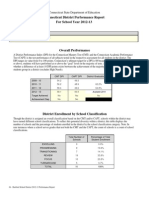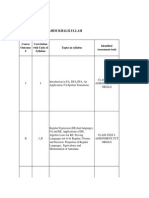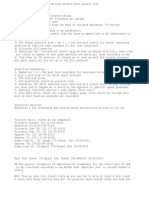0 ratings0% found this document useful (0 votes)
190 viewsStandards-Based Grading - Presentation Slides
Standards-Based Grading - Presentation Slides
Uploaded by
C HeiszThis document provides an overview of standards-based grading (SBG), including its rationale, implementation, and conclusions. Some key points include:
SBG focuses on determining grades based solely on evidence of a student's mastery of standards, not things like behavior. It allows for re-assessment and reporting of student progress. SBG involves creating rubrics aligned to standards and using a scale of 0-50 to determine a student's current level of mastery. Teachers must provide opportunities for re-assessment to demonstrate new learning. Overall SBG aims to make the grading system more transparent and focused on learning rather than points or compliance.
Copyright:
© All Rights Reserved
Available Formats
Download as PDF, TXT or read online from Scribd
Standards-Based Grading - Presentation Slides
Standards-Based Grading - Presentation Slides
Uploaded by
C Heisz0 ratings0% found this document useful (0 votes)
190 views30 pagesThis document provides an overview of standards-based grading (SBG), including its rationale, implementation, and conclusions. Some key points include:
SBG focuses on determining grades based solely on evidence of a student's mastery of standards, not things like behavior. It allows for re-assessment and reporting of student progress. SBG involves creating rubrics aligned to standards and using a scale of 0-50 to determine a student's current level of mastery. Teachers must provide opportunities for re-assessment to demonstrate new learning. Overall SBG aims to make the grading system more transparent and focused on learning rather than points or compliance.
Original Description:
Rationale, Implementation and Conclusions for Standards-Based Grading
CC: BY-NC-SA 4.0
Copyright
© © All Rights Reserved
Available Formats
PDF, TXT or read online from Scribd
Share this document
Did you find this document useful?
Is this content inappropriate?
This document provides an overview of standards-based grading (SBG), including its rationale, implementation, and conclusions. Some key points include:
SBG focuses on determining grades based solely on evidence of a student's mastery of standards, not things like behavior. It allows for re-assessment and reporting of student progress. SBG involves creating rubrics aligned to standards and using a scale of 0-50 to determine a student's current level of mastery. Teachers must provide opportunities for re-assessment to demonstrate new learning. Overall SBG aims to make the grading system more transparent and focused on learning rather than points or compliance.
Copyright:
© All Rights Reserved
Available Formats
Download as PDF, TXT or read online from Scribd
Download as pdf or txt
0 ratings0% found this document useful (0 votes)
190 views30 pagesStandards-Based Grading - Presentation Slides
Standards-Based Grading - Presentation Slides
Uploaded by
C HeiszThis document provides an overview of standards-based grading (SBG), including its rationale, implementation, and conclusions. Some key points include:
SBG focuses on determining grades based solely on evidence of a student's mastery of standards, not things like behavior. It allows for re-assessment and reporting of student progress. SBG involves creating rubrics aligned to standards and using a scale of 0-50 to determine a student's current level of mastery. Teachers must provide opportunities for re-assessment to demonstrate new learning. Overall SBG aims to make the grading system more transparent and focused on learning rather than points or compliance.
Copyright:
© All Rights Reserved
Available Formats
Download as PDF, TXT or read online from Scribd
Download as pdf or txt
You are on page 1of 30
Adventures in Wonderland SBG
Rationale, Implementation and Conclusions
for Standards-Based Grading
https://www.ickr.com/photos/39513508@N06/6648187129/
What do you want GRADES to
COMMUNICATE?
PROVIDE YOUR THOUGHTS:
m.socrative.com
CLASSROOM: [c9c99b35]
RATIONALE
https://www.ickr.com/photos/58612482@N07/5899616481/
ADDICTION
https://www.ickr.com/photos/7729940@N06/6530383391/
https://www.ickr.com/photos/7729940@N06/6530383391/
ADDICTION
The Point-Chasing GAME
https://www.ickr.com/photos/74501279@N00/2022600793/
What would a C+ grade
mean to you?
PROVIDE YOUR THOUGHTS:
m.socrative.com
CLASSROOM: [c9c99b35]
LOOKING FOR ANSWERS
https://www.ickr.com/photos/26604660@N08/3345896050/
Where do you want to be?
Point collecting
or
Attaining mastery
Fixed mindset
or
Growth mindset
Bottom line
or
Feedback
What students did
or
What students know
Mystification
or
Transparency
!
!
!
!
!
IMAGE CREDIT: http://noschese180.wordpress.com/2012/02/23/day-105-sbar-workshop/
http://xkcd.com/937/
CC: BY-NC 2.5
IMAGE CREDIT: http://noschese180.wordpress.com/2012/02/23/day-105-sbar-workshop/
Does your grade book mean anything to anyone other than yourself?
IMAGE CREDIT: http://noschese180.wordpress.com/2012/02/23/day-105-sbar-workshop/
!
What is the PURPOSE of
Assessment?
Use it for
tracking
progress in their
knowledge and
skills.
"
Stop using
grades for
what students
do or dont do;
The Problem of Scales
100 - 90 89 - 80 79 - 70 69 - 60 59 - 50 49 - 0
4 3 2 1 0
The DEAD ZONE
A B C D F
https://www.ickr.com/photos/90217980@N02/8259257800/
Grading Practices that Inhibit Learning
USING ZEROES
Giving zeroes for incomplete work has a devastating effect on
averages and often zeroes are not even related to learning or
achievement but to nonacademic factors like behavior, respect,
punctuality, etc.
[OConnor, K. How to Grade for Learning, Third Edition, Corwin, 2009, 35]
The Problem of Scales
We are using a 100 point scale
in a 50 point system
https://www.ickr.com/photos/12133844@N00/407842334/
The Problem of Scales
100 - 90 89 - 80 79 - 70 69 - 60 59 - 50 49-40 39-30 29-20 19-10 9-0
4 3 2 1 0 -1 -2 -3 -4 -5
A B C D F G ? H ? I ? J ? K ?
The 100 Point Scale The 100 Point Scale The 100 Point Scale The 100 Point Scale The 100 Point Scale The 100 Point Scale The 100 Point Scale The 100 Point Scale The 100 Point Scale The 100 Point Scale
The 50 Point Scale The 50 Point Scale The 50 Point Scale The 50 Point Scale The 50 Point Scale
What happens when we give a ZERO?
Assignment 1
4 100
Assignment 2
3 90
Assignment 3
2 80
Assignment 4
3 90
Up to this point, the student
has a 90 overall (or level 3)
Assignment 5
-5 0
Using a 100 point scale,
overall grade of 72
Assignment 1
4 100
Assignment 2
3 90
Assignment 3
2 80
Assignment 4
3 90
Up to this point, the student
has a 90 overall (or level 3)
Assignment 5
0 50
Using a 50 point scale makes
an overall grade of 82
By using an inappropriate point scale, the student has been penalized an additional 10%!
Not only does Assignment #5 get an F, but it impacts TWO other assessments.
Consider a student with five completed assignments to date:
IMPLEMENTATION
https://www.ickr.com/photos/58612482@N07/5899616481/
WHAT IS SBG?
https://www.ickr.com/photos/43355249@N00/5578743262/
IT IS: IT IS NOT:
#
A conscious linking of assessments
to standards
#
A system which has re-assessment
naturally built-in
#
A determination of grades based
ONLY on evidence of standards
#
Based on the most recent evidence
of progressed learning
#
An average of scores
#
A collection of the highest and
best
#
Awarding BONUS marks for doing
more work the student already
knows how to do.
STEP 1
MAKE
RUBRIC !
https://www.ickr.com/photos/60309882@N00/2057381520/
STEPS 2-4
Backwards design!
Outline your
standards
Design an
assessment
Build your
lessons
https://www.ickr.com/photos/73915810@N00/5990068022/
STEP 5
https://www.ickr.com/photos/60329741@N00/2287322995/
REPORTING & INTERVENTION!
STEP 5
https://www.ickr.com/photos/60329741@N00/2287322995/
REPORTING & INTERVENTION!
WWW.JUMPRO.PE
What does a(n) SB Gradebook Look Like?
DETERMINING A GRADE
START at 50
Full Mastery is 100%
How far of the way to 100 is the student at any given time, considering the
standards covered?
SIMPLE EXAMPLE: A unit has 5 standards, student is at Level 3 for ALL of them
Overall mastery is 15/20
Thats 75% of the way to full mastery
75% of 50 is 37.5
Current grade is 87.5 [B+]
https://www.ickr.com/photos/55231259@N00/5225003774/
HOW IS JOHNNY DOING???
https://www.ickr.com/photos/24662369@N07/2333451896/
RE-ASSESSMENT !
Redos, Retakes and Do-Overs
Teachers must know their class and
set guidelines appropriately
RICK WORMELI on YouTube
PART 1
bit.ly/1nwiyn1
PART 2
bit.ly/1kZezk8
https://www.ickr.com/photos/32224133@N07/7261373934/
RE-ASSESSMENT !
PRIVILEGE vs. RIGHT
EVIDENCE of NEW
LEARNING
MODIFIED ASSESSMENT LIMIT to RETAKES? CUSTOM FINALS
https://www.ickr.com/photos/21560098@N06/9653414876/
OBSERVATIONS & THOUGHTS
I. Students must UNLEARN
II. Archive your assessments
III. Re-assessments should be required
IV. Short, Focused, Frequent
V. Immediate Feedback
VI. Not all standards are created equal [conjunctive grading?]
VII. BUY IN (or not)
VIII. Front Loading
You might also like
- Calapa c3 s4 ReflectivenarrativeDocument1 pageCalapa c3 s4 Reflectivenarrativeapi-399891744No ratings yet
- SEMI-DETAILED LESSON LOG IN MATHEMATICS 5 For CLASSROOM OBSERVATIONDocument7 pagesSEMI-DETAILED LESSON LOG IN MATHEMATICS 5 For CLASSROOM OBSERVATIONMARIS GRACE CARVAJAL88% (16)
- Belly Button Teachings Lesson PlanDocument2 pagesBelly Button Teachings Lesson PlanCaitlinNo ratings yet
- Snowflake's SnowPro Certification Preparation GuideDocument6 pagesSnowflake's SnowPro Certification Preparation GuideAnantNo ratings yet
- 2010 Assessment Moderation Video ConfDocument10 pages2010 Assessment Moderation Video ConfDavid PawleyNo ratings yet
- How To Calculate What You Need On Your Final ExamDocument2 pagesHow To Calculate What You Need On Your Final Examnooluoit100% (1)
- Cost Accounting SyllabusDocument6 pagesCost Accounting SyllabusMariya BhavesNo ratings yet
- $R1R10S7Document16 pages$R1R10S7aaaawfdwaedNo ratings yet
- Other Course Information ARTC 1402 Digital Imaging I / Photoshop I SPRING, 2012Document7 pagesOther Course Information ARTC 1402 Digital Imaging I / Photoshop I SPRING, 2012Janet Palmer Ward ΦθκNo ratings yet
- Copy of Junior Career Exploration Project For Economics and Finance 1Document7 pagesCopy of Junior Career Exploration Project For Economics and Finance 1api-462231355No ratings yet
- Procedure in The Ranking of Honor PupilsDocument15 pagesProcedure in The Ranking of Honor PupilsNormandy MiraflorNo ratings yet
- Activity Based AssignmentDocument40 pagesActivity Based AssignmentSriramulu JaichandarNo ratings yet
- Bridgeport DPIDocument6 pagesBridgeport DPIJordan FensterNo ratings yet
- ENT1000-45651-online-late Start 8-WeekDocument7 pagesENT1000-45651-online-late Start 8-Weekshayacasey.millo.mnlNo ratings yet
- CDL v8Document16 pagesCDL v8Jessica AngelinaNo ratings yet
- Mathematics-9 - Outputs Q1-Q3 SY 2020-2021Document5 pagesMathematics-9 - Outputs Q1-Q3 SY 2020-2021Allona LaronaNo ratings yet
- Spring 2016 Tuesday - Thursday Sec 01Document10 pagesSpring 2016 Tuesday - Thursday Sec 01reycelyn corsinoNo ratings yet
- New Haven DPIDocument6 pagesNew Haven DPIJordan FensterNo ratings yet
- BE300 Spring AssignmentDocument4 pagesBE300 Spring AssignmentSam LeongNo ratings yet
- Econ 3818 Fall 2022 Syllabus AvilaDocument11 pagesEcon 3818 Fall 2022 Syllabus AvilaAhmad MustafaNo ratings yet
- Syllabus MKT 425 Spring 2021 SLN 10643Document7 pagesSyllabus MKT 425 Spring 2021 SLN 10643siddhanth masagoniNo ratings yet
- 107 Temp 21040060259Document2 pages107 Temp 21040060259shivanshusangotra9No ratings yet
- MAT 1033 Syllabus On-Line 91928Document2 pagesMAT 1033 Syllabus On-Line 91928John SchumerNo ratings yet
- AlgebraDocument12 pagesAlgebratharrison25No ratings yet
- Course Syllabus - Fall 2022 - ACISDocument9 pagesCourse Syllabus - Fall 2022 - ACISNS RNo ratings yet
- Hartford DPIDocument6 pagesHartford DPIJordan FensterNo ratings yet
- ACC 1100 A03 (3 CH) Introductory Financial Accounting WINTER 2021Document12 pagesACC 1100 A03 (3 CH) Introductory Financial Accounting WINTER 2021Mariam M. ElgendiNo ratings yet
- S-Curve Exam QuestionsDocument3 pagesS-Curve Exam QuestionsSanjith SadanandanNo ratings yet
- Syllabus - STAT 108 - Fall 2022-4Document10 pagesSyllabus - STAT 108 - Fall 2022-47wfjbxqq6pNo ratings yet
- Handbook ADA 2024Document53 pagesHandbook ADA 2024mikekanna7No ratings yet
- 2322 Outline W 12Document2 pages2322 Outline W 12Hamid AssadullahNo ratings yet
- Cluster University of Jammu (Established by Govt. of J&K) CBCS Exam Scheme Marks-Cum-Grade-SheetDocument2 pagesCluster University of Jammu (Established by Govt. of J&K) CBCS Exam Scheme Marks-Cum-Grade-SheetAnkita ChibNo ratings yet
- Fcs 207 Syllabus Fall 2023 1 1Document5 pagesFcs 207 Syllabus Fall 2023 1 1api-699401346No ratings yet
- Crea204 DebritzDocument11 pagesCrea204 Debritzapi-420899359No ratings yet
- Grade Point and Percentage AveragesDocument1 pageGrade Point and Percentage AveragesmadygeeNo ratings yet
- FINC 409 SyllabusDocument5 pagesFINC 409 SyllabusJohn WolfeNo ratings yet
- VBSpring17 Schedule PDFDocument5 pagesVBSpring17 Schedule PDFAnonymous 0EE22RfWNo ratings yet
- ECON 136A - Intermediate Financial AccountingDocument3 pagesECON 136A - Intermediate Financial AccountingMarcos AvilaNo ratings yet
- CIS197-12b Fall - SyllabusDocument4 pagesCIS197-12b Fall - Syllabustt_aljobory3911No ratings yet
- The Top 15 Online MBA Programmes: Additional Notes Programme Diversity Online DeliveryDocument1 pageThe Top 15 Online MBA Programmes: Additional Notes Programme Diversity Online Deliveryinsomniox18No ratings yet
- Game PIN:: Subject: Organizational LessonDocument3 pagesGame PIN:: Subject: Organizational LessonZuza PodleśnaNo ratings yet
- ACG4632 Introduction To Auditing 0422 Carnes, BDocument9 pagesACG4632 Introduction To Auditing 0422 Carnes, Bmasondonovan033No ratings yet
- Cdfs SyllabusDocument13 pagesCdfs Syllabusjazzybelle6988No ratings yet
- Gpa-Ssc Results 2013 10th Gpa Grading Marks Grade Points Calculation - Jobs Recruitment Exam Results University AdmissionsDocument5 pagesGpa-Ssc Results 2013 10th Gpa Grading Marks Grade Points Calculation - Jobs Recruitment Exam Results University AdmissionsmooorthuNo ratings yet
- Fall 23 FCS 2190 Syllabus With Headings and Tables HeadersDocument9 pagesFall 23 FCS 2190 Syllabus With Headings and Tables Headerssarah calkinsNo ratings yet
- Excel Study PlanDocument6 pagesExcel Study PlanRegister JohnNo ratings yet
- Econ156b Spring 2009Document3 pagesEcon156b Spring 2009Nguyễn Thị Minh HằngNo ratings yet
- Psy 322-90 Syllabus Fall 2013 Cooley-DolesDocument11 pagesPsy 322-90 Syllabus Fall 2013 Cooley-Dolesapi-248118605No ratings yet
- Examination Pattern (Exam 5) : Pattern of Questions in A Case StudyDocument2 pagesExamination Pattern (Exam 5) : Pattern of Questions in A Case Studykaushal kaushalNo ratings yet
- Introduction (Shama)Document22 pagesIntroduction (Shama)daarshaanNo ratings yet
- BA 320 Spring 2015 Blendedrevised.1.13Document9 pagesBA 320 Spring 2015 Blendedrevised.1.13RonakNo ratings yet
- Toa Assessment Modified May 2014Document60 pagesToa Assessment Modified May 2014Sobhan DasariNo ratings yet
- Acct 1110 Syllabus Online 12edDocument4 pagesAcct 1110 Syllabus Online 12edapi-387778696No ratings yet
- Che 101 Twhfr/Y: Take-Home Problem SetDocument2 pagesChe 101 Twhfr/Y: Take-Home Problem SetStl JoseNo ratings yet
- Math 220: Date Created: Created By: Purpose: To Calculate A Grading Curve For The Final Exam of Math 220Document6 pagesMath 220: Date Created: Created By: Purpose: To Calculate A Grading Curve For The Final Exam of Math 220Mohammed ZubairNo ratings yet
- Digital Photo I Sky RevisedDocument4 pagesDigital Photo I Sky RevisedMeredith GiltnerNo ratings yet
- Creo 8 - 0 Basic 2022Document112 pagesCreo 8 - 0 Basic 2022PauloNo ratings yet
- Bayu Aji Setyowibowo - English Major AssignmentDocument3 pagesBayu Aji Setyowibowo - English Major AssignmentBayu Aji SetyowibowoNo ratings yet
- Competency-Based Assessment and EvaluationDocument42 pagesCompetency-Based Assessment and EvaluationDee JacutinNo ratings yet
- ACTG 381 Syllabus - PSU - Fall 2019Document11 pagesACTG 381 Syllabus - PSU - Fall 2019RobPittsNo ratings yet
- Acc211 Fall14Document4 pagesAcc211 Fall14jeremyclarkson0202No ratings yet
- Bharati Vidyapeeth (Deemed To Be University), Pune (India) : School of Distance EducationDocument10 pagesBharati Vidyapeeth (Deemed To Be University), Pune (India) : School of Distance EducationMikail MirzaNo ratings yet
- IB Training CertificatesDocument2 pagesIB Training CertificatesC HeiszNo ratings yet
- 7 & 8 Science - (A5 Electricity and Electrical Devices)Document3 pages7 & 8 Science - (A5 Electricity and Electrical Devices)C HeiszNo ratings yet
- 1:1 Program Guide: Bring Your Laptop (Draft)Document13 pages1:1 Program Guide: Bring Your Laptop (Draft)C HeiszNo ratings yet
- Math With Significant FiguresDocument3 pagesMath With Significant FiguresC HeiszNo ratings yet
- 3 MLP Psychometrics Reliability and Validity 3.1Document26 pages3 MLP Psychometrics Reliability and Validity 3.1Subhas RoyNo ratings yet
- Thinking Like A Geographer - FinalDocument5 pagesThinking Like A Geographer - Finalapi-242330122No ratings yet
- GRE PreparationDocument2 pagesGRE PreparationKamal Ahmed100% (1)
- BED200 A1 NCliftonDocument4 pagesBED200 A1 NCliftonNyha CliftonNo ratings yet
- Trio of Experiential Exercises For HRM Courses 5Document12 pagesTrio of Experiential Exercises For HRM Courses 5Messy MarsidiNo ratings yet
- Edup 3033Document4 pagesEdup 3033Alles Chairol Ac AjNo ratings yet
- Teacher'S Individual Plan For Professional Development (Ippd) For School Year 2021-2022Document6 pagesTeacher'S Individual Plan For Professional Development (Ippd) For School Year 2021-2022Rodelyn CalicaNo ratings yet
- LDhandoutDocument2 pagesLDhandoutUruz86No ratings yet
- Unit 3-What Makes Us Tick Lesson PlanDocument2 pagesUnit 3-What Makes Us Tick Lesson PlanPacurar EmmaNo ratings yet
- Inquiry Approach: Inquiry Teaching Method DO's and DON'TsDocument2 pagesInquiry Approach: Inquiry Teaching Method DO's and DON'TsFides Candy Yarcia BacaniNo ratings yet
- DLL March 5 Pictorial EssayDocument4 pagesDLL March 5 Pictorial EssayJeppssy Marie Concepcion Maala100% (2)
- John DeweyDocument18 pagesJohn DeweyRiza RoncalesNo ratings yet
- 8 Understanding by DesignDocument22 pages8 Understanding by DesignKorin Staana100% (1)
- Learners PortfolioDocument3 pagesLearners PortfolioDrea An100% (1)
- 1 - DLLDocument3 pages1 - DLLDemy MagaruNo ratings yet
- STCDocument3 pagesSTCChris Chen CapistranoNo ratings yet
- Model 3h Final3Document20 pagesModel 3h Final3aimei3h100% (1)
- Rethinking HomeworkDocument6 pagesRethinking Homeworkapi-202412886No ratings yet
- Outcome Based EducationDocument13 pagesOutcome Based EducationJoeriza MoldeNo ratings yet
- Assessment of Learning Research PaperDocument2 pagesAssessment of Learning Research Paperapi-397840564No ratings yet
- Design Learning of FIRST Edu 3 Days L Data Sampai MalamDocument2 pagesDesign Learning of FIRST Edu 3 Days L Data Sampai MalamKusuma DewiNo ratings yet
- Running Head: Learning Theory and Learner Analysis 1Document7 pagesRunning Head: Learning Theory and Learner Analysis 1api-317901188No ratings yet
- Math Lesson Plan - Grade 4Document2 pagesMath Lesson Plan - Grade 4api-247300306No ratings yet
- O Level Pakistan Studies 2059/01: Unit 15Document3 pagesO Level Pakistan Studies 2059/01: Unit 15mstudy123456No ratings yet
- Metacognition in Reading: Reviewing The Literature: Abidin Pammu, Zaini Amir, Tg. Nor Rizan Tg. Mohd. MaasumDocument22 pagesMetacognition in Reading: Reviewing The Literature: Abidin Pammu, Zaini Amir, Tg. Nor Rizan Tg. Mohd. MaasumNajma FitriaNo ratings yet
- Features of Children's DramaDocument11 pagesFeatures of Children's DramaWan Amir Iskandar IsmadiNo ratings yet
- Special Education Terminology: Salt Lake City School DistrictDocument10 pagesSpecial Education Terminology: Salt Lake City School DistrictpadajuzvezdeNo ratings yet





























































































